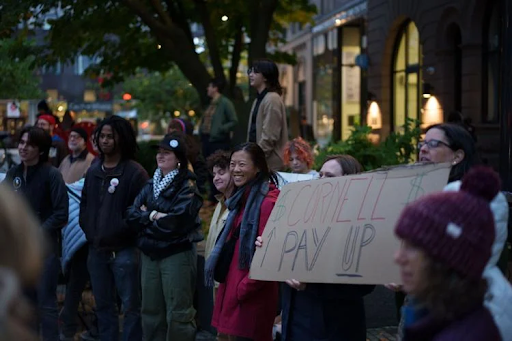
Crowd watches panel discussion. Kathryn Drake
On October 16, about one hundred community members rallied at the Bernie Milton Pavilion on the Commons to demand a yearly ten-million-dollar donation from Cornell to ICSD. This would help make up for the seven-million-dollar budget deficit this school year, lower the tax burden on Ithaca’s property owners, and provide more opportunities for students, staff, and families in the district. Organized by the Ithaca Teachers Association (ITA), the rally was backed by the Ithaca Substitutes Association, Tompkins County Workers’ Center, Cornell American Association of University Professors, Southside Community Center, Ithaca Sunrise Movement, Ithaca Democratic Socialists of America (DSA), and Cornell Young Democratic Socialists of America (YDSA).
In a statement to The Tattler, Cornell’s Vice President for University Relations Joel Malina said that a thriving ICSD is “vitally important to Cornell.” He highlighted the monetary contributions Cornell is already making to the district and the wider community, as well as Cornell’s educational programs for local students and the Lake Source Cooling system used by some ICSD buildings. No response was given to the question of how willing Cornell is to negotiate with ICSD for a potential ten-million-dollar donation.
Due to its non-profit status, Cornell—Ithaca’s largest property owner—is mostly exempt from property taxes, the main source of funding for ICSD. Because of this exemption, the tax burden of ICSD’s budget falls heavier on everyone else. Last year, the Make Cornell Pay coalition organized around increasing Cornell’s voluntary annual payment in lieu of taxes (PILOT) to the City. As a result of this grassroots campaign, Cornell’s PILOT agreement with the City increased from one million dollars to four million dollars a year. Cornell also increased its yearly contribution to ICSD from 500,000 to 650,000 dollars. However, with property taxes higher than ever and a more difficult ICSD budget year than in recent memory, the ITA and their allies argue that that is not enough.
Despite the chilly weather, the ITA’s rally attracted broad community support. Aurora Rojer, the secretary of the ITA, a social studies teacher at LACS, and the emcee for the rally, kept the energy high throughout with chants and pop quizzes. “What do we want?” she asked the crowd. “Big Red bucks!”
Mayor Cantelmo gave a brief opening speech at the rally, arguing that Cornell could not only afford to donate much more to ICSD but also benefit because lower property taxes would make it easier to attract new faculty.
Next, Board of Education member Dr. Jill Tripp, who wrote the resolution for ICSD to start negotiating for ten million dollars from Cornell, spoke about the potential of this donation to boost Cornell and ICSD’s symbiotic relationship. She argued that the excellent quality of Ithaca’s schools is central to Cornell’s ability to recruit more faculty to bring their families to Ithaca and that “that excellent education is at some risk at this point.”
Cornell freshman and YDSA member Sam Poole spoke next, emphasizing the connections between the Make Cornell Pay ICSD campaign, bargaining by Cornell Graduate Students United and UAW 2300, and resistance to Cornell’s punishment of peaceful campus protestors. At the core of all these issues, he argued, was the fact that Cornell is a “quintessentially corporate university that values profit over people.”
Two ICSD students spoke at the rally too, highlighting how increased funding from Cornell could improve their education. Maddie, an eighth grader at DeWitt Middle School, addressed the effects of recent budget cuts on students and the struggles her teachers face with such limited finances. Brandon DePaulo, a senior at LACS and a student representative to the Board of Education, spoke of the effort required to create high-quality education and how little Cornell contributes to ICSD in comparison even to universities with much smaller endowments. “If Cornell paid, the lives of thousands would improve substantially,” he argued. “All it requires is some selflessness from Cornell.”
Katie Sims, the electoral chair of the Ithaca DSA, provided historical context for Ithaca’s negotiations with Cornell in their speech. They described how former mayor Ben Nichols used the City’s power to withhold building permits from Cornell to win millions of dollars in voluntary contributions. Sims used this example to argue that, no matter how powerful the Cornell Board of Trustees appears, “the reality is that we actually do have a lot of power because Cornell relies on our community.”
The next speaker was John Tavares, the First Vice President of UAW 2300, a union of thousands of workers in the Ithaca area including Cornell service and maintenance employees. Tavares gave an energetic speech about how the UAW 2300 was able to win better working conditions and wages from Cornell thanks to public support and solidarity. “If your bargaining team’s firm, if your members are behind you, if your community is there, victory is not just possible, it’s inevitable,” he concluded.
Kathryn Cernera, president of the ITA, gave closing remarks, thanking attendees and summarizing upcoming action opportunities.
